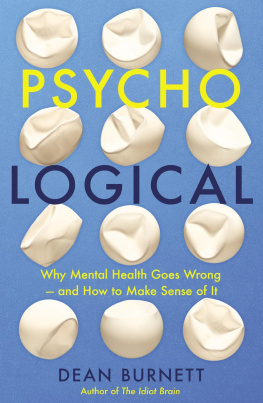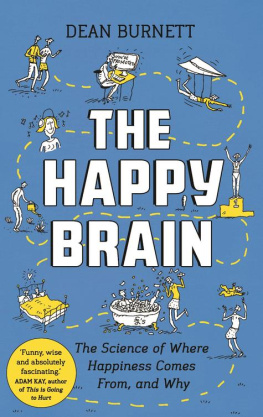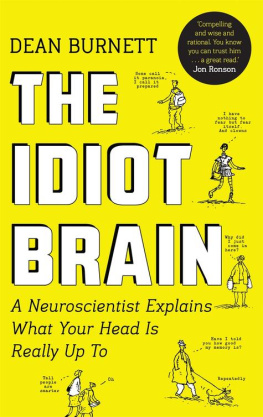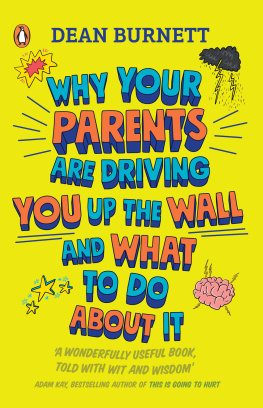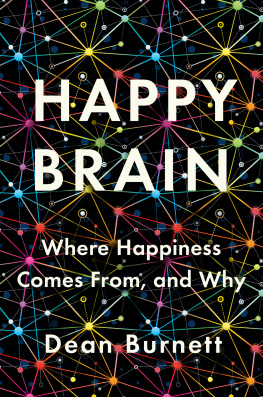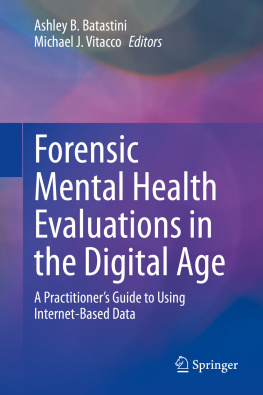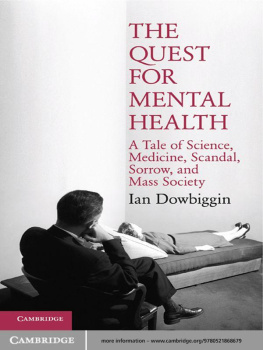Hello, Im Dean Burnett, and this is Psycho-Logical,a book all about mental health.
Now, mental health is a very big area, and a sensitive, evocative and emotional one at that. So, lets clear up a few things from the start.
Firstly, this is a book about mental health, but its not about mymental health. No, this is a more general exploration of the current scientific understanding of mental health, covering what we think is going on in our brains (and sometimes bodies) when our mental health goes awry, why mental health problems are so common, and how people deal with all this and still live relatively normal lives. Its an as-logical-and-rational-as-possible look at psychological problems, hence the vaguely clever title.
The reason I dont talk about my ownmental health is that I really dont have anything to say about it. Thus far, Ive been one of the lucky ones whos never really had to deal with any difficulties with it. Ive had my ups and downs, sure! Ive encountered the extremes of the emotional spectrum thanks to things that have happened in my life, good and bad. But Id say that these fall within the normal parameters of everyday human existence, as Ive never been in therapy, taken psychoactive medication, or struggled to function in the wider world for reasons beyond circumstance, inexperience or just general ignorance.
Some people may be surprised to hear that, as pretty much any modern book about mental health focuses on the experiences of the author in dealing with their own issues. Obviously, I cant do this at least, not without straying far outside of the non-fiction category. So, what gives me the right to throw my proverbial hat into the ring?
Well, let me begin by introducing myself. As stated, Im Dean Burnett. Im the author of The Idiot Brain, The Happy Brain, Why Your Parents Are Driving You Up the Wall and What To Do About It,and countless blogs, articles and other pieces of work centred around the quirky and weird properties of the human brain. I write about the brain because Im a doctor of neuroscience. My PhD thesis is available at the British Library or the Cardiff University website if you want to check it out yourself.
I was also head tutor and lecturer for Cardiff Universitys Masters course in psychiatry for many years, responsible for teaching qualified students and medics all aspects of psychiatry, from the basic science to the latest diagnosis and treatment methods, the rules and regulations governing their use, and much more. A job like that, coupled with years spent studying the workings of the brain itself, will certainly give you a very thorough understanding and appreciation of mental health and all the related aspects. Or so Id argue, anyway.
Since then, Ive written a lot about mental health, and people seemed to really like it when I did. A lot of things Ive written are now used as training, reference and teaching materials, by groups as diverse as A-level psychology courses, NHS libraries, organisations like the Samaritans, counselling bodies, and so on.
Why me, though? Im not actually certified to diagnose and treat mental health problems, and there are undoubtedly thousands whose knowledge of mental health rivals or exceeds my own. So, why would I get singled out?
Well, Im a neuroscientist for one. If it helps, think of me as an experienced car designer; I can tell you all about how cars work, but I cant necessarily fix yours, and I certainly cant issue you with a driving licence. Those are different skill sets.
I focus largely on the workings of the brain, and thats the one constant in all matters of mental health. You cant have mental health without the brain being involved, and its a thing we can (within reason) look at, measure and analyse with science. By sticking to whats going on in the brain, I can hopefully make matters of mental health more grounded and relatable.
Also, Im told my way of talking about mental health resonates because its a lot clearer and more compassionate than most. Flattery this may be, but I will say that I do try to avoid inflexible conclusions and a hectoring tone, I endeavour to avoid stigmatising at all costs, and I always try to point out my own ignorance and the limits to my knowledge, so much so that my editors regularly ask me to stop.
Part of this tendency comes from the fact that Ive been doing stand-up comedy as a hobby for close to twenty years now. Spending nearly two decades standing in front of drunken strangers who have no reason to like you, and trying to win them over in five minutes using just words, will patently affect your communication skills. It forces you to at least try to be relatable, likeable, engaging and comprehensible very quickly, or you get eaten alive.
I dont mean that literally, of course. Although you hear stories about certain gigs
Perhaps a more important aspect was my upbringing, which differs greatly from that of most high-profile academics.

